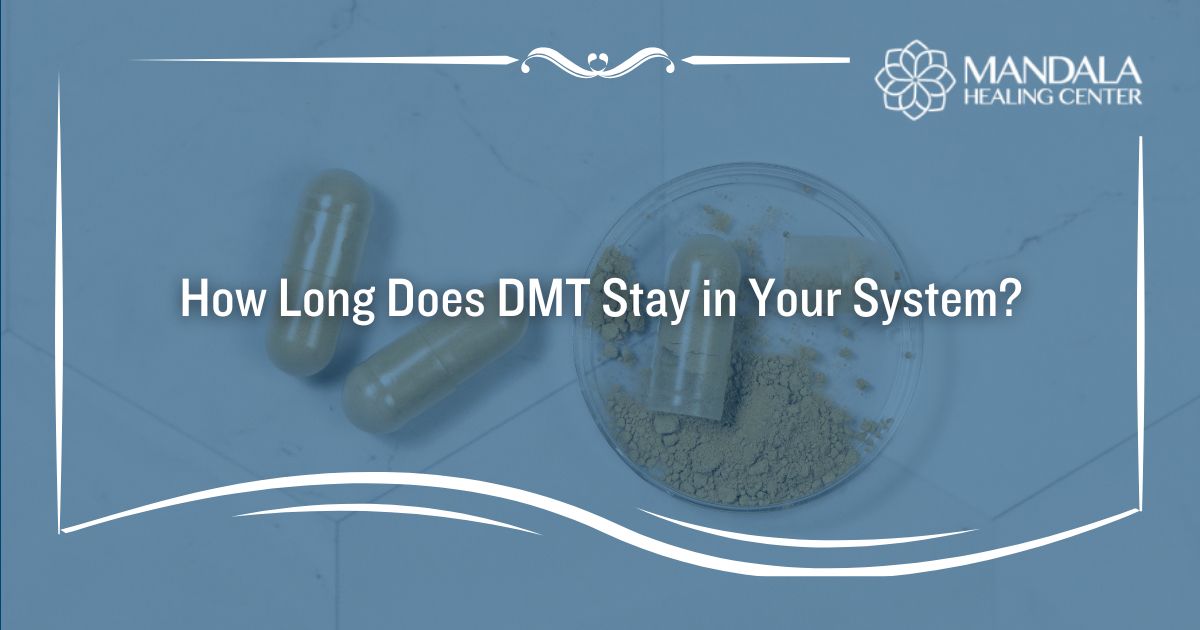Dimethyltryptamine (DMT) is a hallucinogenic drug that causes intense hallucinations and a detachment from reality. The substance is chemically similar to psilocybin, however, the effects are more intense and short-lived when compared to shrooms. That said, DMT can be incredibly damaging to your mental health.
According to the National Institute on Drug Abuse (NIDA), 7.4 million people in the United States abused drugs like DMT in 2021.[1]
If you or a loved one abuse DMT, you might be wondering how long it stays in your system. Its half-life is only between 9 to 12 minutes, which means your system eliminates it within 30 minutes to one hour.[2]
However, drug tests can detect DMT for a longer period because it leaves behind metabolites in your urine, blood, saliva, and hair follicles. For example, urine testing can find DMT in your system for 24 hours after your last dose.
In this article, you will learn:
- How long the effects of DMT last
- How long does DMT stay in your system
- How long can drug tests detect DMT
How Long Do the Effects of DMT Last?
DMT trips include visual and auditory hallucinations that feel real. You might not be able to distinguish fantasy from reality while you are under the influence of DMT. It is also common to have out-of-body experiences.
Additional effects of DMT include:
- Dilated pupils
- Shifts in mood
- Feelings of euphoria or fear
- Increased sensitivity to bodily sensations
- Increased heart rate and blood pressure
- Anxiety and confusion
It is most common to smoke DMT, however, some people take it by intravenous injection. Either way, the effects begin almost instantaneously. DMT causes short-lived effects, lasting up to 45 minutes.
Despite this, it is possible to have a bad experience when you consume DMT. Even though the effects last less than an hour, you might feel like the trip is neverending when you are under the influence. Because the effects can be intense and frightening, it is best to avoid abusing this substance.
What is the Half-Life of DMT?
To understand how long a drug stays in your system, you need to know what a half-life is. A drug’s half-life explains how quickly your system eliminates half of a dose. It can take 4 to 5 half-lives for your body to completely flush out a substance.
The half-life of DMT is relatively short, between 9 to 12 minutes.[2] Your body will eliminate it within 30 minutes to one hour.
Personal factors can affect how long DMT stays in your system. For example, the speed of your metabolism, your overall health, the dose you take, and how often you consume DMT can all play a role. Taking DMT more frequently or in higher doses can cause it to build up in your body and stay detectable in your system longer.
How Long Can Drug Tests Detect DMT?
Drug tests can detect DMT in your system for longer than one hour. The type of drug test being used will play a role in how long DMT is detectable. For example, hair follicle testing can find DMT in your system longer than urine, saliva, or blood testing.
It is also important to note that standard drug tests will not find DMT. Specialized tests must be ordered to determine if you have been abusing the drug.
Urine
Urine tests are the most commonly used drug tests because they are minimally invasive and relatively cheap. You might be given a urine test before getting a job, while attending a rehab center, or in a probation office.
Drug tests can detect DMT in urine for up to 24 hours after your last dose.
Blood
Blood tests are not used as frequently as urine tests because they are invasive, requiring a blood draw to be analyzed. However, they might be used in hospital settings to determine if a drug is contributing to your symptoms.
Blood tests can only find DMT in your system for one hour after you use it, making it less ideal for DMT testing than other types of drug screens.
Saliva
Saliva tests are not used as commonly as urine tests for the same reasons as blood screens. They offer a short window of detection that is inconvenient for administrators of the test. They are convenient for law enforcement officers who are attempting to determine if you have been driving under the influence of a drug.
Saliva drug tests can detect DMT in your system for one hour after you last used it.
Hair
Hair follicle testing is not favored by the medical community because it offers unreliable results due to discrimination based on factors like hair color. Additionally, it is expensive to have hair tests analyzed in the lab.
That said, hair tests offer the longest window of detection. They can find any drug, including DMT, in your system for up to 90 days after your last dose.
Find Help for DMT Abuse and Addiction
If you or a loved one suffers from long-term DMT abuse, it’s time to seek professional help. Substance abuse treatment programs like the Mandala Healing Center are here to help you achieve long-term recovery.
Contact us today for more information on our DMT addiction treatment program.
References:
- The National Institute on Drug Abuse (NIDA): Psychedelic and Dissociative Drugs
- The National Library of Medicine (NLM): Pharmacokinetics of N,N-dimethyltryptamine in Humans












